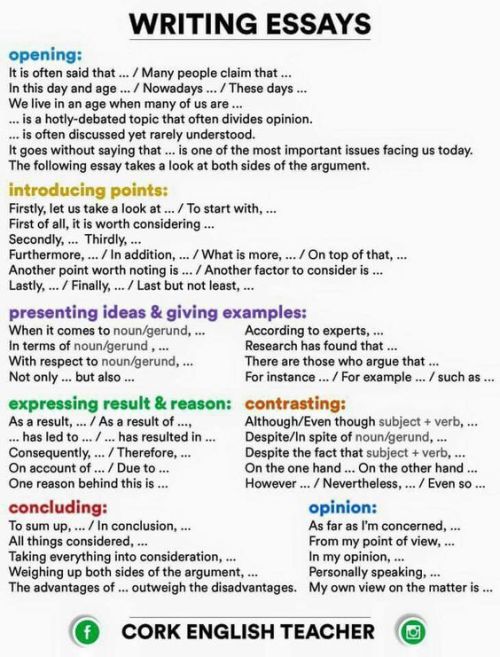Do Words Good - Tumblr Posts

I just got a job as a writing tutor, and it inspired me to start a series of writing masterposts! From teaching college composition for two years at grad school and from working as a consultant at my university’s Writing Center, I’ve come to learn a few things about writing I’d like to share. Some of these tips may sound basic, and some may be fresh to you. Some may meet you exactly where you are. Regardless, these are some of the foundational aspects of good college writing.
I. Content & Style: Avoid Fluffy Language
Perhaps this is a symptom of trying to meet page minimums, but some students tend to inflate sentences with unnecessary adjectives. Similarly, they may puff up an essay with a useless statement, like, “Depression affects people in various ways.” What follows a sentence like this is usually a cataloging of the various/numerous/diverse ways in which depression affects people. Kill the middleman: that useless sentence. Be assured that most readers are astute enough to infer that depression affects people in many ways when you list said ways.
Language that sounds like that of a motivational speaker is maddening to most college instructors. “If you are true to yourself, you will be happy in life.” “Friends and family are the most important way to get the emotional support you need.” These are platitudes and overly generalize. Broad claims make for unoriginal writing; be specific and back up your claims with a logical argument, providing evidence for your opinion. Broad generalizations like, “Since the dawn of time, people have loved art” are just padding and detract from more interesting ideas you may have.
II. Description: Be Concrete and Concise
An easy way to avoid vague fluff is to use concrete images and concise language. First, if you can say something in five words instead of ten, that’s great! Go with the five. Second, concrete details provide a more refined image in the reader’s mind (car vs. Ford Taurus, for example) without the use of adjectives and adverbs. And try to avoid adverbs when you can. Show how a person is running “quickly” instead of telling the reader the person is running quickly. Is there sweat? Is this person bumping into others? Are the legs pumping like pistons? Specificity makes for much more interesting writing.
III. Organization: Make a Backwards Outline!
The best thing about outlines is that you ultimately do not have to follow them. Many people use the drafting process to think and come up with their best idea in the middle of the paper. But often the papers that are turned in are first drafts, so that great idea—around which you ought to have centered your paper—remains in the middle, not standing front and center and lacking enough space to develop further. If you’ve allowed yourself enough time to make a second/final draft, post-organize your paper. Map out the flow of your ideas and ask yourself if this is the best order and arrangement possible. Yes, revision is more work, but it is worth it. It is so, so, obvious to professors when a paper has not been properly organized.
IV. Grammar: Comma Splices
The most common grammatical error students make is the comma splice. A comma splice is the attachment of two sentences with only a comma. For example: “Harvey and Tim built a raft, they took it out on the river later.” ARGH. “Harvey and Tim built a raft” is a complete sentence, as is “they took it out on the river later.” How do you fix a comma splice? Well, there are three ways:
Use two separate sentences: “Harvey and Tim built a raft. They took it out on the river later.”
Add a conjunction after the comma: “Harvey and Tim built a raft, and they took it out on the river later.”
Use a semicolon: “Harvey and Tim built a raft; they took it out on the river later.
Standard/Edited (American) English grammar is the grammar of (American) academia and will be for a while. Also, simply, spelling and grammar mistakes only work to undermine your writing. If you have brilliant ideas, you shouldn’t obfuscate them with lousy grammar.
V. Language: Build Your Vocabulary
What does “obfuscate” mean? Well, when you encounter unfamiliar words, look them up and commit their meaning to memory. Practice using them, when appropriate. Of course I don’t bloat your language so that your prose reads like a thesaurus. Your writing should sound intelligent/formal (with the help of new words), yet not awkward and stiff with the clumsy handling of “big” words.
VI. Scoring: Read What You Wrote Out Loud
This is pretty basic. Listening to your own writing will help you determine if it sounds stiff and/or unnatural or just awkward as hell. You can read your writing aloud to yourself, but it is best to hear another person read it. I refer to this section as “scoring” because writing has a musical aspect, too. Your use of language should be pleasing, made so by choosing the right word for the right moment, by opting for combinations of words that sound harmonious, and so that your delivery of ideas is arranged to have the most powerful impact. Choose a tone suited to your subject, and know thy audience. What will sound good to you may not sound so good for your intended audience. Adjust the score accordingly.
VII. Research: Do More of It Than You Think You Need To
Often you will be assigned a minimum number of sources for a research paper. Let’s say five, for example. Go for eight or nine. Of course you should avoid using redundant sources (a book on Samuel Beckett’s stage directions and journal article about Samuel Beckett’s stage directions). Find as many perspectives as possible; it’ll only make your arguments stronger. Plus the more academic writing you read, the more naturally it’ll come when you have to do your own.
VIII. Go Weird or Go Home
Another reason more using sources than required can help: finding unique perspectives/approaches to a subject. You may encounter some ideas that counter popular assumptions (peer pressure has some positive impacts; depression can sometimes benefit cognitive function; anti-drug education actually increases drug use). Another interesting tack to take is to go with a subject that often makes people uncomfortable, such as child sexuality, masochism, and alternatives to capitalism.
Strange, uncommon arguments are more interesting than broader overly researched topics, such as nature vs. nurture. A paper on the deliberate use of plot holes, in Mary Shelley’s Frankenstein, and their effect on narrator reliability would be far more interesting than the representation of capitalism in Animal Farm by George Orwell. The more complex and difficult the argument you choose the more critical thinking/writing skills you demonstrate. Weirdness is rewarded in academia, by getting your professor’s attention, by getting published in critical journals, etc. In this case, the axiom of “Be unique, and stand out in the crowd” stands true.
I hope this was helpful! Message me or send me an ask if you have any questions.
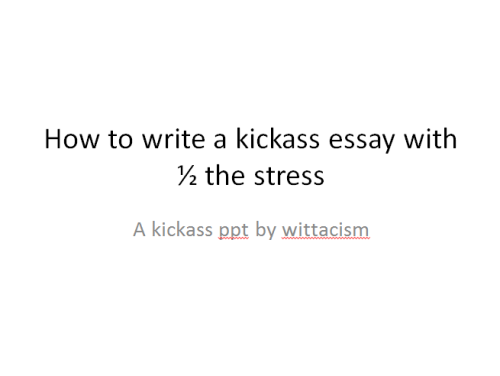


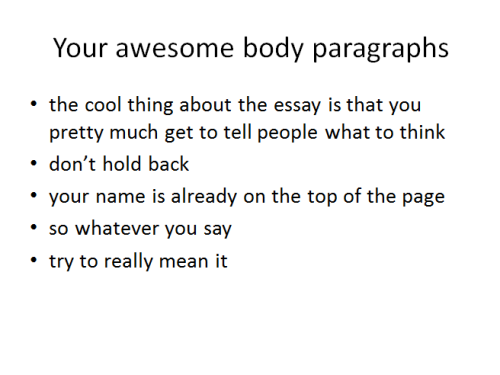
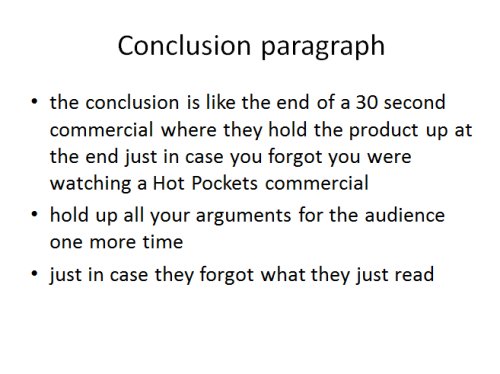
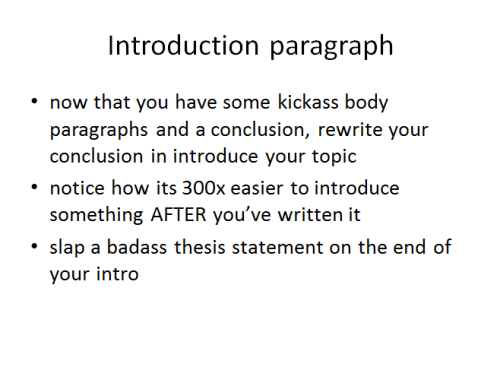
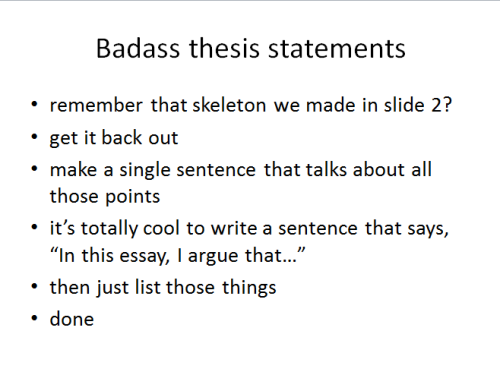
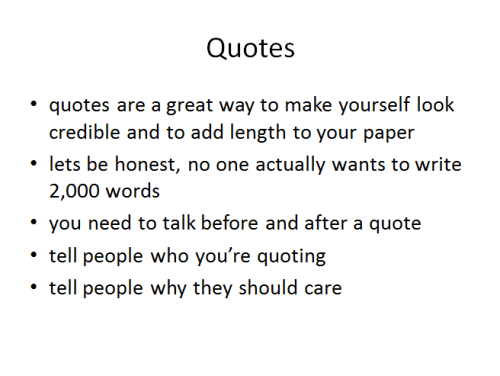
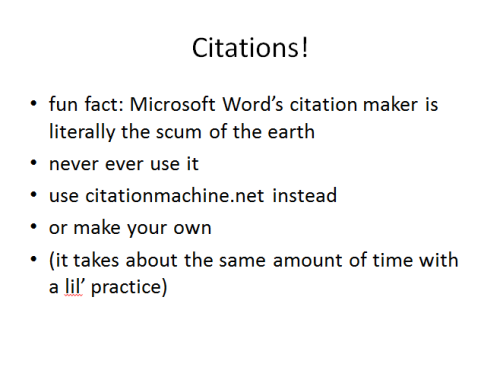

It’s essay writing season for tons of students!
After being a college writing tutor for over a year, I thought I would share my advice with all you awesome people on tumblr. This is how I write essays, but if you’ve got more tips, feel free to add them below.
Happy writing. You can do it!


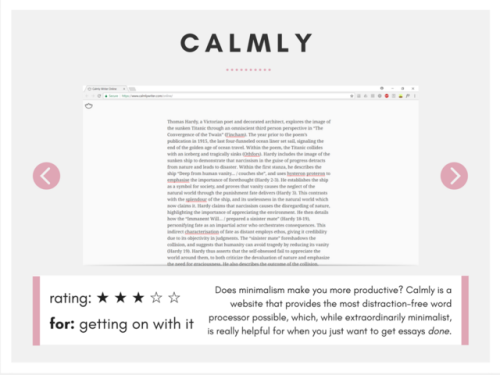
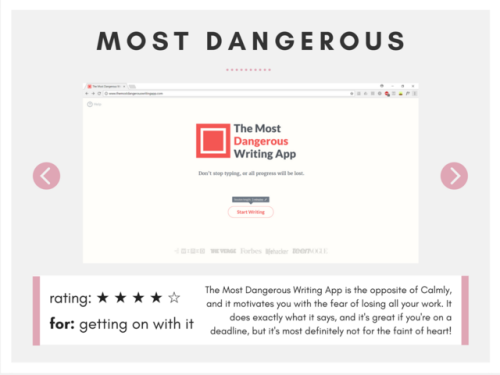

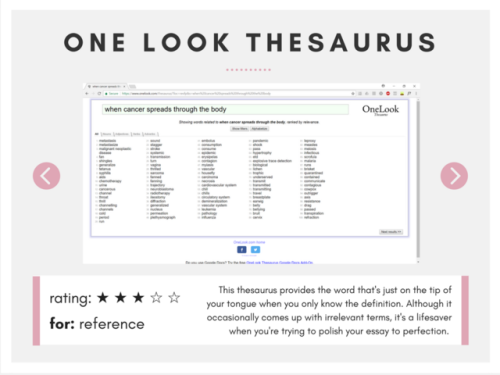


Here’s some weapons for your essay writing arsenal!
Hemingway Editor Calmly Writer The Most Dangerous Writing App Purdue O.W.L. One Look Thesaurus JSTOR Google Scholar
Reply with your favourite or other great websites I didn’t include!

I just got a job as a writing tutor, and it inspired me to start a series of writing masterposts! From teaching college composition for two years at grad school and from working as a consultant at my university’s Writing Center, I’ve come to learn a few things about writing I’d like to share. Some of these tips may sound basic, and some may be fresh to you. Some may meet you exactly where you are. Regardless, these are some of the foundational aspects of good college writing.
I. Content & Style: Avoid Fluffy Language
Perhaps this is a symptom of trying to meet page minimums, but some students tend to inflate sentences with unnecessary adjectives. Similarly, they may puff up an essay with a useless statement, like, “Depression affects people in various ways.” What follows a sentence like this is usually a cataloging of the various/numerous/diverse ways in which depression affects people. Kill the middleman: that useless sentence. Be assured that most readers are astute enough to infer that depression affects people in many ways when you list said ways.
Language that sounds like that of a motivational speaker is maddening to most college instructors. “If you are true to yourself, you will be happy in life.” “Friends and family are the most important way to get the emotional support you need.” These are platitudes and overly generalize. Broad claims make for unoriginal writing; be specific and back up your claims with a logical argument, providing evidence for your opinion. Broad generalizations like, “Since the dawn of time, people have loved art” are just padding and detract from more interesting ideas you may have.
II. Description: Be Concrete and Concise
An easy way to avoid vague fluff is to use concrete images and concise language. First, if you can say something in five words instead of ten, that’s great! Go with the five. Second, concrete details provide a more refined image in the reader’s mind (car vs. Ford Taurus, for example) without the use of adjectives and adverbs. And try to avoid adverbs when you can. Show how a person is running “quickly” instead of telling the reader the person is running quickly. Is there sweat? Is this person bumping into others? Are the legs pumping like pistons? Specificity makes for much more interesting writing.
III. Organization: Make a Backwards Outline!
The best thing about outlines is that you ultimately do not have to follow them. Many people use the drafting process to think and come up with their best idea in the middle of the paper. But often the papers that are turned in are first drafts, so that great idea—around which you ought to have centered your paper—remains in the middle, not standing front and center and lacking enough space to develop further. If you’ve allowed yourself enough time to make a second/final draft, post-organize your paper. Map out the flow of your ideas and ask yourself if this is the best order and arrangement possible. Yes, revision is more work, but it is worth it. It is so, so, obvious to professors when a paper has not been properly organized.
IV. Grammar: Comma Splices
The most common grammatical error students make is the comma splice. A comma splice is the attachment of two sentences with only a comma. For example: “Harvey and Tim built a raft, they took it out on the river later.” ARGH. “Harvey and Tim built a raft” is a complete sentence, as is “they took it out on the river later.” How do you fix a comma splice? Well, there are three ways:
Use two separate sentences: “Harvey and Tim built a raft. They took it out on the river later.”
Add a conjunction after the comma: “Harvey and Tim built a raft, and they took it out on the river later.”
Use a semicolon: “Harvey and Tim built a raft; they took it out on the river later.
Standard/Edited (American) English grammar is the grammar of (American) academia and will be for a while. Also, simply, spelling and grammar mistakes only work to undermine your writing. If you have brilliant ideas, you shouldn’t obfuscate them with lousy grammar.
V. Language: Build Your Vocabulary
What does “obfuscate” mean? Well, when you encounter unfamiliar words, look them up and commit their meaning to memory. Practice using them, when appropriate. Of course I don’t bloat your language so that your prose reads like a thesaurus. Your writing should sound intelligent/formal (with the help of new words), yet not awkward and stiff with the clumsy handling of “big” words.
VI. Scoring: Read What You Wrote Out Loud
This is pretty basic. Listening to your own writing will help you determine if it sounds stiff and/or unnatural or just awkward as hell. You can read your writing aloud to yourself, but it is best to hear another person read it. I refer to this section as “scoring” because writing has a musical aspect, too. Your use of language should be pleasing, made so by choosing the right word for the right moment, by opting for combinations of words that sound harmonious, and so that your delivery of ideas is arranged to have the most powerful impact. Choose a tone suited to your subject, and know thy audience. What will sound good to you may not sound so good for your intended audience. Adjust the score accordingly.
VII. Research: Do More of It Than You Think You Need To
Often you will be assigned a minimum number of sources for a research paper. Let’s say five, for example. Go for eight or nine. Of course you should avoid using redundant sources (a book on Samuel Beckett’s stage directions and journal article about Samuel Beckett’s stage directions). Find as many perspectives as possible; it’ll only make your arguments stronger. Plus the more academic writing you read, the more naturally it’ll come when you have to do your own.
VIII. Go Weird or Go Home
Another reason more using sources than required can help: finding unique perspectives/approaches to a subject. You may encounter some ideas that counter popular assumptions (peer pressure has some positive impacts; depression can sometimes benefit cognitive function; anti-drug education actually increases drug use). Another interesting tack to take is to go with a subject that often makes people uncomfortable, such as child sexuality, masochism, and alternatives to capitalism.
Strange, uncommon arguments are more interesting than broader overly researched topics, such as nature vs. nurture. A paper on the deliberate use of plot holes, in Mary Shelley’s Frankenstein, and their effect on narrator reliability would be far more interesting than the representation of capitalism in Animal Farm by George Orwell. The more complex and difficult the argument you choose the more critical thinking/writing skills you demonstrate. Weirdness is rewarded in academia, by getting your professor’s attention, by getting published in critical journals, etc. In this case, the axiom of “Be unique, and stand out in the crowd” stands true.
I hope this was helpful! Message me or send me an ask if you have any questions.
How to finish that last minute assignment






I don’t know about you guys but I am psyched to get an education, woo. This year is a hella important year for me because if I don’t finish this school year with five As then I am a dead man walking, you get me? So this started off as a collection to help me get those fabulous As but I thought, what the hell? I’ll share this perfection with everyone else because sharing is caring. Anyways, down to the nitty gritty
001. CALEDONIA'S DECLASSIFIED SCHOOL SURVIVAL GUIDE
how to survive freshmen year of high school
college packing list
alternative to buying expensive textbooks
dorm room survival
free online college courses
002. WRITE LIKE A FUCKING ANGEL
the ultimate guide to writing
how to write good
how to write an essay
how to write a good essay
the five paragraph essay
deadly sins checklist
formatting your paper
tips on getting started
seven tips to become a better writer (stephen king)
four ways to have confidence in your writing
seven ways to speed up your writing
five ways to add sparkle to your writing
how to finish what you started: a five step plan for writers
thirty-one ways to find inspiration for your writing
tips for dealing with writer’s block
003. READING ISN’T ONLY FOR NERDS AND FANGIRLS
how to take care of your books
how to read shakespeare
no fear shakespeare (i found this incredibly useful when studying macbeth!)
one hundred most read books
how to read difficult books
how to read faster
books made into movies
books made into tv shows
350+ free ebooks
004. STUDY MOTHER FUCKER
studying techniques
how to pull an all-night and still have a successful exam result
how to get motivated to study
tips to help you concentrate
time management tips
chrome site blocker
005. LEARNING SHIT
solve any maths equations: 1, 2.
when your teacher says not to use wikipedia (an alternative)
square root calculator, cube root calculator
for when you can’t do your homework
chemical equation balancer (what got me through chemistry last year)
cliffnotes, sparknotes
college courses
how to: multiply big numbers
crash courses (youtube)
teaches you everything
006. PRESENTING YOUR BEAUTIFUL SCHOOL WORK AY
free powerpoint (prezi)
free powerpoint presentations on anything
help with presentations
007. USEFUL WEBSITES BECAUSE THE INTERNET IS A WONDERFUL PLACE /SOMETIMES/
TED (basically gods gift)
challenge your brain
feed the hungry and up your vocabulary game
free online textbooks
final grade calculator
a whole page dedicated to studying and organising
008. MUSIC TO CALM DOWN UR SCHOOL DAY BLUES YO
a really chill playist
coffee shop blues
coffee shop sounds
calm nature sounds
concentration/focus playlist
relaxation is key
four hours of classical music
playlists to listen to: xxx, xxx, xxx, xxx, xxx, xxx, xxx, xxx, xxx, xxx, xxx, xxx.
009. ALL THIS STUDYING??? YOU NEED A BREAK, MY FRIEND.
watch a cute ass dog lick your screen
one hundred thousand stars
movies masterpost
foreign movies
gay movies
lesbian movies
lesbian movies you should definitely watch
broadway musicals
LGBT+ books
download free books
read any book
the best masterpost ever if you’re bored
010. TIPS FOR SCHOOL N STUFF BCUS I WANTED TEN BITS
try your best. not everyone can get all As, and getting all As does not make you better than everyone else. just do the best you can and be the best person you can be.
don’t sleep in class! i know it seems so so tempting but slept my way through geography last year and i got a C in my exam instead of the expected A so…
Don’t tick off your teacher, follow the rules to an extent, get to class on time, respect your classmates and teachers. you know, just be a decent person.
be positive!!! and not just for the first week or so, keep the positivity going throughout the whole school year. if you don’t believe in yourself then why should anyone else?
“you can do it, wildcat, i believe in u” — something troy bolton said one time probably definitely
directory
click the tags on this post!
there’s general grownup stuff (#adulting, #self care, #saving money, #living n shit)
food (#food n stuff, #cooking, #recipes)
textbook links (#textbook)
essay writing tips (#do words good, #writing)
emergency advice (#in crisis, #medical)
posts with multiple kinds of help (#trail mix, #assorted tips)
